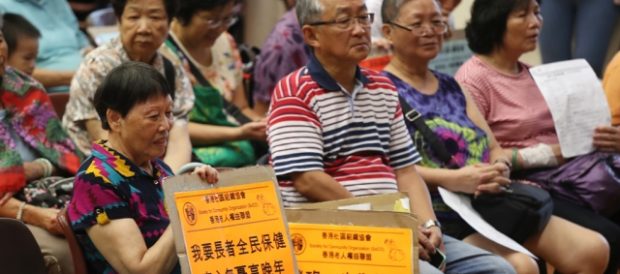Returning to senior citizens their own assets
(Next Magazine, 2017/02/23, A002, Second Opinion, Bill Stacey)
Returning to senior citizens their own assets
American journalist and essayist HL Mencken described how candidates for office go about their task – they “search out groups who pant and pine for something that they can’t get, and to promise to give it to them. Nine times out of ten that promise is worth nothing. The tenth time it is made by looting ‘A’ to satisfy ‘B’. In other words, government is a broker in pillage, and every election is a sort of advance auction on stolen goods.”
That seems an apt description of the current CE election. Despite the sincere recognition of candidates that we have problems, most of the solutions offered rely on spending taxpayers money. Education, healthcare and mass housing are areas of growing need, but the presumption of candidates is largely that these are needs the “government” should meet from taxation. The challenges of an ageing population increase the demands for government spending.The truth is that these needs can only be met by increasing the wealth and productive potential of our people. Let me suggest a proposal that could both improve that productive potential, directly support the needs of the elderly and recognize the contribution that as past taxpayers they have made to what is great about Hong Kong today.The government holds in trust for our people substantial commercial assets. It owns 100% of the airport, Kai Tak Cruise Terminal, the Cross-Harbour Tunnel, Cyberport, Science Park, the Hong Kong Mortgage Corporation, the Hong Kong Trade Development Council’s Convention and Exhibition Centre, 76% of MTR Corporation, 53% of Hong Kong Disneyland, 5.45% of Hong Kong Stock Exchange and numerous other assets that either are, or could easily be commercially viable. Why not distribute these assets to our senior citizens to secure their retirement and healthcare needs?
These assets have been built up from the patronage, taxation and enterprise of the postwar generation that has or will soon retire. Ownership of these assets could be separated from the government in a trust, with the units of the trust distributed to the people who ultimately created them. The proceeds from sale of units in the trust could in part provide for the livelihood of senior citizens and potentially be converted into individual health savings accounts or annuities for pensions. For the disciplines of this proposal to work, it is crucial for the assets to be tradable and individually owned.Although privatization has worked very well in Hong Kong, when tried, it has become politically unpopular. This proposal would allow assets to be commercially managed, but keep broad public ownership. The trustees would be obliged to owners to maximize the value from assets and would restructure, reinvest, sell or hold those assets recognising that the commercial realities change. This would significantly increase the return on lazy assets, improve accountability and depoliticize management. The scheme would reduce inter-generational conflict, giving the older generation recognition from their effort and the potential to better stand on their own two feet. It would not be a panacea, depending on where lines are drawn, a rough estimate of the market value of the assets today suggests that most retirees would still need to make further provision for their own retirement.
It would require fiscal discipline from the government going forward. The assets would not be available in the same way for future generations, but younger people have time now to make private provision for themselves. Alternative schemes for pensions come with a large fiscal burden, but no efficiency benefits and they erode prudence and individual responsibility. Sir John Cowperthwaite taught us that money should be left to “fructify in the pockets of the taxpayer.” A threat to our potential growth is the high and rising role of the government in the economy. If we can better manage the commercial assets held by the government, it can transform productivity. If individuals can build up more capital and use it productively, higher growth makes current problems more manageable.
Bill Stacey
Director
The Lion Rock Institute

